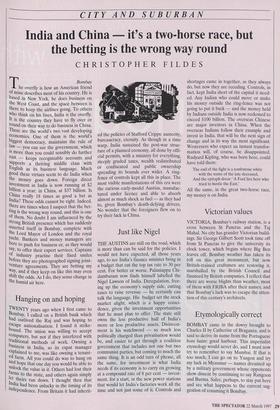Hanging on and hoping
TWENTY years ago when I first came to Bombay, I called on a British bank which had outlived the Raj and was hoping to escape nationalisation. I found it strike- bound. The union was willing to accept computers, but not if they interfered with traditional methods of work. Owning a business in India, so its expat manager explained to me, was like owning a tenant- ed farm. All you could do was to hang on and hope that one day you would be able to Unlock the value in it. Others had lost their farms to the state, and others again simply let theirs run down. I thought then that India had been unlucky in the timing of its independence. From Britain it had inherit- ed the policies of Stafford Cripps: austerity, bureaucracy, eternity. As though in a time warp, India sustained the post-war struc- ture of a planned economy, all done by offi- cial permits, with a ministry for everything, steeply graded taxes, wealth redistributed or confiscated and public ownership spreading its bounds ever wider. A ring- fence of controls kept all this in place. The most visible manifestations of this era were the curious early-model Austins, manufac- tured under licence and able to absorb almost as much shock as fuel — as they had to, given Bombay's death-defying drivers. No wonder that the foreigners flew on to try their luck in China.


































































 Previous page
Previous page